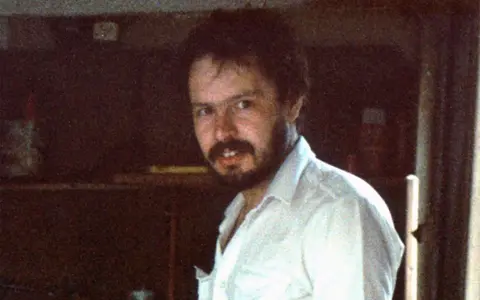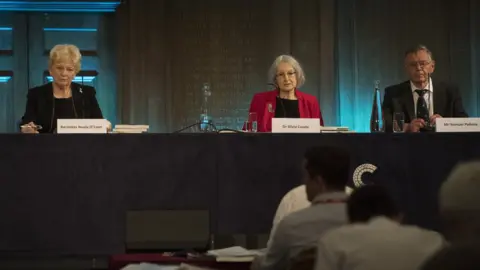Daniel Morgan case: Ex-suspect denies corruption hindered police investigation
A private detective who was a prime suspect during inquiries into the murder of Daniel Morgan has denied corruption hampered the police.
An independent panel found evidence Jonathan Rees drank in pubs with police officers close to the investigation, even after he became a suspect.
Mr Rees told the BBC he did not consider exchanging information with police officers as being corrupt.
He was acquitted of murder in 2011 after the case against him collapsed.
Daniel Morgan was found dead in a pub car park in South London in 1987. He had been attacked with an axe.
Mr Rees - who in 2000 was convicted in a separate case on charges of conspiring to pervert the course of justice, along with a corrupt police officer - told the BBC he denied involvement in the murder.
He said: "Danny was my friend", adding that his former business partner's death had caused him "financial and business grief".
Despite four police investigations, there have been no convictions.
In its report last week, the Daniel Morgan Independent Panel concluded forms of police corruption had hampered both the murder inquiry, and its own work to investigate the reasons why the case was never solved.
Jonathan Rees and Daniel Morgan ran a small private investigation agency, Southern Investigations, in the 1980s. Mr Rees concentrated on investigations for defence lawyers, while Daniel Morgan specialised as a bailiff and debt collector.
According to the report of the independent panel, police became suspicious after seeing Jonathan Rees's "extremely nervous" behaviour on the night of the murder.
Later an inquest witness claimed he had been told that Mr Rees had paid to have Mr Morgan murdered because the partners had fallen out over the running of the business.
Police also considered a series of other possible motives for whoever carried out the murder, including that Mr Morgan might blow the whistle on corrupt police officers, financial pressures, a reprisal from someone he'd collected a debt from, or something in his private life.
 PA Media
PA MediaAsked by the BBC if he had killed Daniel Morgan, Mr Rees said: "No. For what motive?"
"Danny was my friend... he taught me a lot and earned the firm a lot of money. It was a partnership. And so the more he brings in, the more I bring in, the more profits we get to share at the end of the year. And it worked well.
"So him dying caused me a massive amount of grief, financially and business-wise, because the partnership ceased to exist."
The independent panel found "extensive evidence" of links between Jonathan Rees, a police officer friend - Metropolitan Police detective sergeant Sid Fillery - and other officers, even after Mr Rees had become a suspect in the murder.
Mr Rees accepts that at the time he regularly drank with serving police officers.
But he said: "Relationships between a journalist or private investigator with officers in the case, and lawyers and barristers exchanging information, I don't see that as corrupt.
"It's up to the individual officers and people involved to make sure that they don't break the law, they don't get involved in serious illegal activities."
Asked whether he personally knew any police officers who he regarded as corrupt, he said: "I've never worked with them."
"There were some people that I wouldn't cross the road to talk to them," he added. "There were some wrong'uns, that they got themselves involved in things that were totally illegal and wrong."
'Shambolic investigation'
So what information was considered by the panel about Mr Rees's relationships with police officers?
It found there was past intelligence suggesting that of 19 former police officers associated with Mr Rees, his firm and Mr Fillery, 10 had been convicted of criminal offences and sent to prison.
According to the panel, the offences included:
- false imprisonment
- perverting the course of justice
- drugs offences
- accepting a bribe
- obtaining property by deception
- accepting bribes for confidential information
- theft of files
- fraud related to computer misuse
One officer had resigned while under investigation and another had been dismissed for failing to meet standards of honesty and integrity.
Nigel Shepherd, a lawyer representing Mr Rees and Mr Fillery, said the intelligence report was an attempt by police to cover their "shambolic investigation" and its claims could not be verified.
Mr Rees said he had employed some police officers who had been suspended for disciplinary reasons, though "some we couldn't take on because of what they were accused of."
He insisted they were valuable to his firm as "experienced investigators" but "it doesn't mean we condone anything they did".
However in 2000, Mr Rees was himself convicted of conspiring to pervert the course of justice with another corrupt officer, Det Con Austin Warnes.
They arranged to plant drugs in the car of a young mother and have them discovered by the police. Jonathan Rees was working for her husband during a custody battle.
Mr Rees told the BBC he was innocent of that offence and the conviction was being considered by the Criminal Cases Review Commission.
The CCRC told us it had rejected his application for an appeal in December.
 PA Media
PA MediaThe panel also revealed a Metropolitan Police analysis from 2000 detailing 273 cases where "journalists were provided with confidential information" by Mr Rees's company.
Mr Rees told the BBC he had never paid police officers cash, but that he did pay their expenses and bought them drinks and meals.
'Unprofessional relationship'
Mr Rees also dismissed suggestions that his decision to give Mr Fillery a job at Southern Investigations after Morgan's death was part of a plan to fill a "dead man's shoes".
Mr Fillery worked on the Met Police's initial investigation into Mr Morgan's murder, and at one point took a witness statement from his friend, Jonathan Rees.
He then went on to join Southern Investigations. Mr Rees said this was "nearly two years" after Daniel Morgan's murder.
Yet the panel report refers to evidence that Mr Fillery, while he was a detective, told other officers seven months after the murder that he might go and work for Mr Rees, and before taking the job, he worked without pay at the firm.
The panel concluded there was evidence indicating Mr Rees had a "very close and unprofessional relationship with Det Sgt Fillery". At one point the officer had left a police file in his car.
'No evidence'
The panel report contains dozens of allegations about or criticisms of Mr Rees. He was sent a long list before it was published.
But the panel did not accuse him or anyone else of involvement in Mr Morgan's murder. It is not a court, and that was not its remit.
Mr Rees said the reason the case against him and other defendants had collapsed was not because of police corruption, but because "there was no evidence against us".
Allegations against him came in "anonymous phone calls, letters, gossip, and vicious rumours".
Jonathan Rees and his lawyer, Nigel Shepherd, also believe police incompetence is the main reason why Mr Morgan's killer was never found.
Mr Shepherd points to the panel's revelation that 30 years after the murder, a Parker pen - likely to be MrMorgan's - was found in a police store where it had been kept after being recovered from his car.
Mr Rees's statement in 1987 included a suggestion that his business partner had been writing with it as they sat together in a pub, shortly before he was attacked and killed.
The pen was not found, casting doubt on this account.
Mr Rees believes police were "blinkered", pursuing one line of inquiry, that he was part of a murder conspiracy.
He continues to work as a private investigator.
